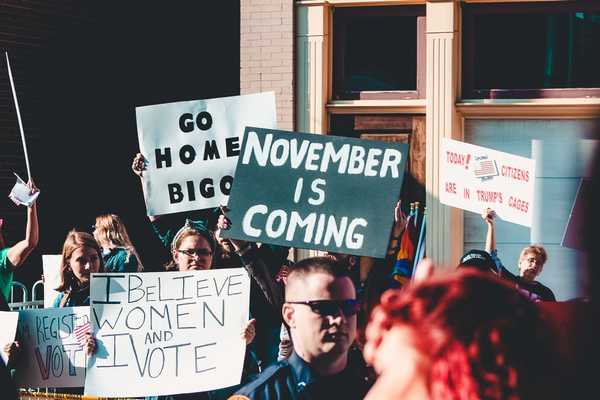In 1955, only 43 black voters in Terrell County, Georgia, were allowed to vote in a county that had 5,036 black people of voting age, almost twice the number of whites who could vote. A county voting registrar, J.G. Raines, turned down four college-educated black applicants because they mispronounced words. When one black teacher with a PhD from New York University made a federal complaint about Raines, she was fired.
On September 4, 1958, William P. Rogers, the Attorney General under President Eisenhower, then brought suit against Raines for discriminating against blacks in voter registration and requiring them to answer more difficult questions than whites. Charles Bloch, a Macon white supremacist attorney, represented the county. Bloch once wrote a letter to Senator Richard B. Russell in which many quoted him comparing African-Americans to farm animals: “Hogs and pigs have their separate pens; chickens have their coops; cattles have their barns; horses and mules have their stables; and none of them eat with people.” The power of the federal government to sue the county was a newly granted power derived from the 1957 Civil Rights Act, which was the first civil rights act.
On April 17, 1959, a federal judge in the middle district of Georgia, Judge Thomas Hoyt Davis, sided with Bloch and declared that the attorney general had no authority under the new Civil Rights Law to seek injunctions against private citizens, voiding the ability of the federal government to seek action against Raines. “Congress should not be allowed to extend the authority of the federal government into this field,” Davis wrote in his decision. It was a decision that would define the judge in spite of a career largely favorable to civil rights.
In response, Rogers issued a stern rebuke of Davis, saying that Davis’ decision “interfered with the legal right of people in a democracy to vote without regard to race or color.” He asked the nine justices of the court to overturn Davis’ decision, and declared the decision “erroneous.” The attorney general arguing Supreme Court cases was highly uncommon: in the 13 years before this case, no attorney general had ever argued a Supreme Court case in person – indicating that Davis’s ruling marked a substantial blow to civil rights. The Washington Post and Time Herald’s editorial board would call Davis’ decision a “judicial lynching of the Civil Rights Act.”
On February 29, 1960, the Supreme Court struck down Judge Davis’s ruling, saying that “the District Court erred in dismissing the complaint on the theory that the Act would exceed the permissible limits of the Fifteenth Amendment.” Instead, in an opinion written by Justice William Brennan, the Supreme Court upheld unanimously the opinion that Raines’s actions were in violation of the Fifteenth Amendment, and ultimately dismissed Judge Davis’s decision.
Judge Davis’s ruling on the 1957 Civil Rights Bill remains his most famous civil rights decision and marked him as an enemy of civil rights. However, Davis made two very key choices throughout his career that played a pivotal role in advancing civil rights that largely go unnoted.
Thomas Hoyt Davis, born in Braselton, Georgia, on July 4, 1892, was the youngest of 12 children and the first member of his family to attend college. After graduating with a B.A. from Mercer University in 1913, he “read for the law” and passed the bar exam in 1916. He fell under the strong influence of a Georgia lawyer, Walter George, a strong segregationist. While Hoyt Davis went into private practice, Walter George began serving on the Supreme Court of Georgia.
Soon, his close relationship with Senator George would lead him to many coveted legal positions in the federal government. After his private practice, he served as state solicitor general of the Cordele Judicial Circuit from 1927 to 1933. Franklin D. Roosevelt then named Davis U.S. Attorney for the Middle District of Georgia in 1933.
It was near the end of Davis’s term as U.S. Attorney when he was faced with a civil rights case that would have enormous implications. He was the prosecutor in a case trying a white sheriff for unjustly beating down and killing a black man on the courthouse steps.
On January 9, 1943, Sheriff Claude Screws of Baker County, Georgia, arrested Robert Hall, a black mechanic, for the theft of a tire. Screws handcuffed Hall and took him to the courthouse. As Hall walked up the stairs to the courthouse, Screws and two policemen beat Hall with their fists and a solid-bar blackjack, claiming later that Hall reached for a gun and used insulting language.
Even after Hall was handcuffed, however, the two policemen allegedly beat Hall for another fifteen to thirty minutes. They then transported him from the courthouse yard to a jail, where he was thrown onto the floor. According to John C. Derms, the owner of the truck tire that Hall was alleged to have stolen, Hall was later transported to the hospital. where he passed away (with 21 bruises and abrasions). Derms would describe the back of his head “as soft as a ripe tomato.”
One federal witness would later say that Screws had said, “That damn Negro has lived long enough.” An FBI handwriting expert said that Screws' arrest warrant was forged, and Derms claimed that the truck tire was never stolen. Both Derms and his brother claimed, in fact, that they never signed any warrant and preferred no charges to be brought against Hall.
On February 11 Davis, as U.S. Attorney, reported the death of Hall to the FBI. The next day in a federal court, he requested an immediate investigation by the bureau and charged Screws with violating Hall’s civil rights. At the time, few local cases of white on black violence in the South resulted in convictions. At the federal trial, Davis drove a point that was “the most damaging to defense arguments” when he said, “Picture, if you can, a red-faced police officer beating a poor, law-abiding Negro until he wades in his own blood.” In response to a claim by a defendant that Hall had used an epithet and threatened to kill the police officers, Davis said to the jury: “There is no evidence presented here to show that Hall tried at any time to commit suicide. But that is exactly what such a thing would amount to, and there is scarcely a Negro who does not know this.”
Screws and his two accomplices were then convicted by a federal jury for violating Hall’s civil rights, which led to fines of $1,000 each and three years of prison. The Atlanta Daily World would credit Davis with arguing with “forceful eloquence and consummate logic.” To show the unpopularity of Davis’ role, while Screws was being tried, he was re-elected as sheriff by Baker County. The Fifth U.S. Circuit Court of Appeals would affirm the conviction with only one judge dissenting. But remarkably, in a ruling that has baffled legal scholars and civil rights advocates ever since, the ruling would be reversed by the Supreme Court in Screws vs. United States in 1945 in a contested 5-4 decision. William Douglas, one of the most liberal Supreme Court justices in history, would write that Screws operated “under the color of law,” and that Screws did not violate Hall’s civil rights because Screws "did not have the intent of violating his civil rights" when he killed him. This dealt a devastating blow to the ability of civil rights cases to be tried federally.
On January 4, 1945, Franklin Roosevelt nominated Davis to replace the late Bascom Deaver as a federal district judge of the Middle District of Georgia. He was recommended by Senator Walter George and endorsed by Senator Richard Russell.
In Davis’ first case as federal judge in 1945, Reverend Primus E. King of Columbus sued election registrars for depriving him the right to vote in the 1944 Democratic primary. In Georgia, the Democratic Party primary at the time was the only relevant election, as the Republican Party was very weak in the South.
On July 4, 1944, Primus King wanted to vote in the Democratic Party primary. At the Muscogee County Courthouse, he was turned away by a police officer who escorted him back to the street. Immediately after his rejection, King walked several blocks to see Oscar D. Smith Sr., an attorney who arranged a lawsuit against the Muscogee County Democratic Party Executive Committee, which was chaired by Joseph E. Chapman. With the backing of the NAACP, King sought $5,000 and a judgment against the exclusion of blacks in the Democratic primary. Only a year earlier, the U.S. Supreme Court had decided the Smith v. Allwright case that ruled a similar white primary unconstitutional in Texas. For the white registrars, this case represented a last-ditch attempt to keep the black minority subordinate.
According to historian John Egerton, “Judge Davis, at fifty-three a lifetime member of the ruling class, was being called upon to listen and interpret and finally resolve the conflict with the wisdom of Solomon.”
For three eventful days, Davis’ courtroom was completely crowded with a segregated audience of Georgians around the state who came to Columbus. Harry S. Strozier, the attorney hired by Oscar Smith for King, argued that the right of a citizen to vote in any primary was “a right secured by the constitution.” Charles Bloch, the segregationist hired by the Muscogee County Democratic Party, claimed that the Democratic Primary was a private organization which had complete control of the process.
In court, Davis pressed Bloch with the question, “What alternative do the negroes have?” He did so repeatedly, until Bloch was forced to admit that under Bloch’s interpretation of the state primary, Negroes could only form a party of their own or join some other white group who wished to fuse with them.
In his 29-page opinion to the District Court on October 12, 1945, Davis cited the Supreme Court cases Smith v. Allwright and United States v. Classic to give a victory for civil rights and black citizens in the South. “As I understand the holding and meaning of Smith v. Allwright, it is controlling here.” He would charge the Muscogee County Democratic Executive Committee to pay $100 to Primus King and he also declared that the denial to vote in any state-sanctioned election on account of race was unconstitutional. The Muscogee County Democratic Executive Committee had deprived King of his Fourteenth, Fifteenth, and Seventeenth Amendment rights. He decided that since the Democratic Party was the dominant political party in Georgia, the primary was indeed an integral part of the electoral process and not a private “club” for the elite in the party.
For Judge Davis to make a decision declaring the white primary unconstitutional was a devastating blow to his popularity. One reader to the Atlanta Constitution, Hiram Dunn, wrote that Davis was “taking away our State’s right.” Eugene Talmadge, the former Georgia governor, was so enraged by the decision that he called for a state legislative decision to save the white primary. Davis was Senator George’s “eyes in Georgia,” and owed his nomination as federal judge to him. His close allegiance with many segregationist political leaders led many to see his action as a breach of trust. Many, afterwards, saw him as a turncoat. But at that moment, on that day, Thomas Hoyt Davis made a landmark victory for civil rights. His ruling would later be upheld by the 5th Circuit Court of Appeals and Supreme Court. Unlike his prosecution in the Screws case, his “forceful eloquence” ultimately paid off.
Davis’s decision won a crucial victory for the voting rights of blacks in the south. After the case, Primus King would be the first black man that Thomas Hoyt Davis shook hands with.
Davis’ decision 12 years later to overturn the 1957 Civil Rights Act would be (to many) the lasting legacy to his career. In 1948, both of Davis’ retinas detached while he was listening on a case. Davis would become blind in both eyes. At the time, the Northern District judge wanted Judge Davis to retire and guaranteed that he would find someone else to handle his cases.
“Ain’t nobody handling any of my cases for me,” Davis said, according to John Davis.
Members of Davis’s family regret the decision of Judge Davis to rule the 1957 Civil Rights Bill unconstitutional. According to John Davis, Davis’ grandson, Davis’ son regrets not persuading him to leave the bench earlier, while Judge Davis’s daughter was “furious” at the decision of her father that betrayed the earlier parts of his legacy.
“He probably should have retired sooner than he did,” said grandson, John Davis. “His mind was not as sharp as it had been.”
At the time, he would go on to sit more federal cases than anyone else in the Georgia circuit, never neglecting his workload because he was blind. His roommate from law school, Trammell F. Shi, a law professor at Mercer University, would become the legal assistant and law clerk of Judge Davis, reading each case to him. This workload was substantial since the Middle District spanned 242 miles from Thomasville to Athens, requiring Senator George to nominate another federal judge, Abe Conger, to help Judge Davis hear cases.
Ultimately, outside influences would get the best of Judge Davis late in his career. In conversation, Davis’s daughter would blame Trammell Shi for the 1957 Civil Rights Bill decision as he exerted more and more influence over Davis’s legal decisions after his blindness.According to the family, the 1957 ruling was out of character for Judge Davis, who would retire four years later in 1961 and die in 1969.
For the man’s decision-making to be labeled a “judicial lynching” and “erroneous” is unfair. Throughout his career as both a U.S. Attorney and federal judge, Davis made critical breakthroughs in prosecuting a sheriff for killing a black man and abolishing the white primary. For the entirety of his career, Davis played a monumental role in advancing civil rights in Georgia, regardless of labels put on him.
The link to the original paper, with citations, is attached.



















